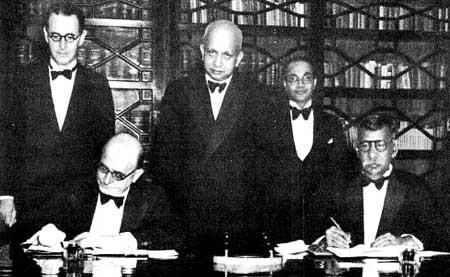Agreements signed prior to Independence
 |
| Prime Minister D. S. Senanayake and Governor Sir Henry Monk Mason Moore sign the agreements. |
November 1947, is an eventful month in the constitutional history of Sri Lanka.
The first official declaration of the intention to grant Independence had been made in June 1947. That was when, on June 18, 1947, a declaration was made in the British House of Commons by the Secretary of State for the Colonies and in the State Council (Ceylon) by the Governor. The declaration stated that as soon as the necessary agreements had been negotiated and concluded on terms satisfactory to the two Governments, immediate steps would be taken "to confer upon Ceylon fully responsible status within the British Commonwealth of Nations."
On November 14, 1947, a memorandum was published by Prime Minister D. S. Senanayake to the effect that five documents were needed to bring that status commonly referred to as 'Dominion Status.' The first document was an Act of Parliament to confer on the Ceylon Parliament full legislative powers and to deprive the Government of the United Kingdom of responsibility for the Government of Ceylon. (This was later passed as the Ceylon Independence Act 1947).
The second was an Order-in-Council to remove the limitations on fully responsible status contained in the Ceylon (Constitution) Order-in-Council of 1946. (The new one was called the Ceylon (Independence) Order-in-Council 1947).
The third was a Defence Agreement between the two Governments to provide for the taking of any necessary measures for defence as might be mutually agreed.
The fourth was an External Affairs Agreement regulating certain matters relating to external affairs and giving Ceylon the international status possessed by the Dominions.
The fifth was a Public Officers Agreement transferring to the Government of Ceylon the responsibilities previously vested in the UK Government in respect of certain classes of public officers.
The announcement came three days after these Agreements were signed. They were signed in Colombo by Governor Sir Henry Monk Mason Moore on behalf of the United Kingdom and Prime Minister D. S. Senanayake for the Government of Ceylon. After the legal documents received the royal assent on December 10, 1947, they took effect on February 4, 1948, the day Ceylon became an Independent nation within the British Commonwealth of Nations.
Working together
Commenting on the days prior to the signing of the agreements, Governor Sir Monk Mason Moore wrote: "Mr Senanayake and I worked together most harmoniously. We were working against time and the quick and most obvious procedure was simple, to amend those provisions of the Soulbury Constitution which gave the Governor the right to act on his discretion in the case of reserved subjects. These meant, of course, that the Prime Minister now had the sole right of nomination to the five "appointed" seats in the House of Representatives, to half the seats in the Senate and to the membership of the Public Service Commission. It, of course, added greatly to the Prime Minister's powers and was indeed of assistance to Mr. Senanayake whose position was by no means secure at the time."
'Historic
occasion'
When the Independence Bill was taken up for discussion in the British House of Lords on December 5, 1947, Lord Soulbury who was Chairman of the Commission on Constitutional Reforms in Ceylon (he later became Governor-General in Independent Ceylon), said: "With such great interest as we have in each other's prosperity, with such kindly, good humoured, charming and courteous people, with such natural resources and with leaders of proven experience, I feel that Ceylon can face the future under the happiest auspices. This is a historic occasion. It is a landmark in the development of the evolution of the British Empire and it brings another step nearer what I believe to be the ultimate aim of British statesmanship – the fusion of the Empire and the Commonwealth."
When Sir Monk Mason Moore decided to relinquish his duties on health grounds with arthritis bothering him, Lord Soulbury was invited to succeed him as Governor General. The offer was gladly accepted. |

